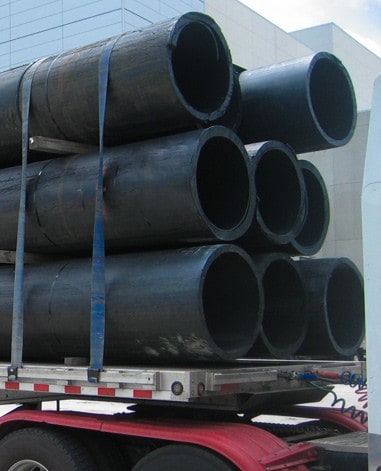Understanding the Secret Benefits of HDPE Pipeline for Water and Wastewater Management
Using HDPE pipeline in water and wastewater administration presents countless benefits that merit factor to consider. Its phenomenal longevity and lengthy life expectancy make it a favored choice for lots of projects. In addition, the product's resistance to corrosion and chemical damages improves its integrity in different atmospheres. The benefits extend past just long life and resistance. Midland TX HDPE Pipe Fittings in Stock. Discovering its cost-effectiveness and environmental effect reveals much more engaging factors for its widespread fostering in modern facilities
Exceptional Toughness and Longevity

HDPE pipeline stands out for its remarkable sturdiness and durability, making it a favored selection in water administration systems. Constructed from high-density polyethylene, these pipes can endure considerable pressure and stress, making certain reputable efficiency over time. Their robust nature enables them to sustain severe ecological problems, consisting of temperature level fluctuations and soil movements, which can cause other materials to fail.
The life expectancy of HDPE pipelines usually goes beyond half a century, providing an economical option for towns and industries alike. In addition, the product's light-weight residential properties streamline installment, reducing labor prices and durations. This resilience minimizes the demand for constant repair services or replacements, further boosting its financial appeal.
In water management applications, the integrity of HDPE pipelines indicates less interruptions and improved service continuity, making them important to lasting infrastructure development. The combination of toughness and longevity solidifies HDPE's function as a foundation in reliable water management services.

Resistance to Corrosion and Chemical Damages
While many products catch deterioration and chemical damage with time, HDPE pipes display remarkable resistance, making them optimal for various water administration applications. This strength stems from the molecular structure of high-density polyethylene, which is naturally non-reactive and does not corrode like metals or weaken from exposure to severe chemicals. Because of this, HDPE is highly reliable in atmospheres with aggressive materials, such as wastewater systems that may have acids, bases, and natural solvents.
Furthermore, HDPE pipelines can endure ecological elements such as dirt level of acidity and saline conditions, better boosting their viability for diverse applications (American Plastics HDPE Pipe for Oilfield). Their capacity to maintain structural stability with time lowers the risk of leaks and failures, which is crucial in making certain the safety and security and integrity of water circulation and wastewater monitoring systems. The resistance to corrosion and chemical damage substantially contributes to the total effectiveness and long life of HDPE piping solutions.
Cost-Effectiveness and Economic Benefits
When taking into consideration the financial ramifications of water management systems, the cost-effectiveness of HDPE pipelines ends up being apparent. These pipelines supply lower installation and upkeep expenses compared to typical materials like metal or concrete. Their light-weight nature simplifies transport and setup, leading to reduced labor expenses. In addition, HDPE pipelines show a lengthy life expectancy, usually exceeding half a century, which converts to less replacements and long-lasting savings.
Additionally, the resistance of HDPE to rust and chemical damage minimizes the demand for pricey fixings and substitutes. The pipes likewise sustain effective water circulation, decreasing power prices related to pumping systems. By mitigating leakages and water loss, HDPE pipelines add to substantial economic advantages for towns and industries alike. On the whole, the initial financial investment in HDPE piping can generate substantial financial returns over the lifespan of the water monitoring system, making it a sensible choice for lasting facilities development.
Environmental Sustainability and Reduced Influence

Convenience and Adaptability in Installment
Due to the fact that of their unique homes, HDPE pipelines provide impressive flexibility and flexibility in installation, making them suitable for a variety of applications. Their lightweight nature allows for easier handling and transportation, reducing labor costs and setup time. HDPE pipelines can be curved and formed to fit various surfaces and project needs, which is especially helpful in challenging atmospheres.
Additionally, their resistance to rust and chemical damages permits for installation in diverse setups without the requirement for specialized safety layers. The capability to fuse joints creates a constant, leak-free system, enhancing the total integrity and integrity of the setup. HDPE's flexibility additionally suits ground motion, minimizing the risk of damages in areas vulnerable to moving dirt. In general, these features make HDPE pipes not only functional but additionally a recommended option for water and wastewater administration systems.
Regularly Asked Inquiries
How Does HDPE Pipe Compare to PVC in Water Administration Applications?
HDPE pipeline provides superior flexibility, resistance to deterioration, and longevity compared to PVC. Its lighter weight assists in easier installation, while its lengthy life-span minimizes substitute prices, making HDPE a favored selection in water administration applications.
What Is the Lifespan of HDPE Pipeline Under Normal Problems?
Under common problems, HDPE pipelines can have a lifespan ranging from 50 to 100 years. Their sturdiness and resistance to deterioration add to their long-term efficiency in numerous applications, making them a reliable choice for facilities.
Are HDPE Piping Recyclable After Their Service Life?
Yes, HDPE pipes are recyclable after their life span. custom hdpe pipe manufacturing Midland TX. They can be refined and repurposed right into new products, substantially reducing ecological effect and promoting useful source sustainability within the industry, making them a green choice for piping remedies
What Is the Setup Process for HDPE Piping?
The installation procedure for HDPE pipes entails site preparation, trenching, pipeline blend or mechanical signing up with, backfilling, and pressure testing. Correct methods assure a resilient and efficient system for transferring water and wastewater effectively.
Can HDPE Water Lines Be Used for Both Potable and Non-Potable Water Equipments?
Yes, HDPE pipelines can be utilized for both drinkable and non-potable water systems. Their convenience, longevity, and resistance to rust make them suitable for different applications, ensuring risk-free and reliable transport of water in various contexts.